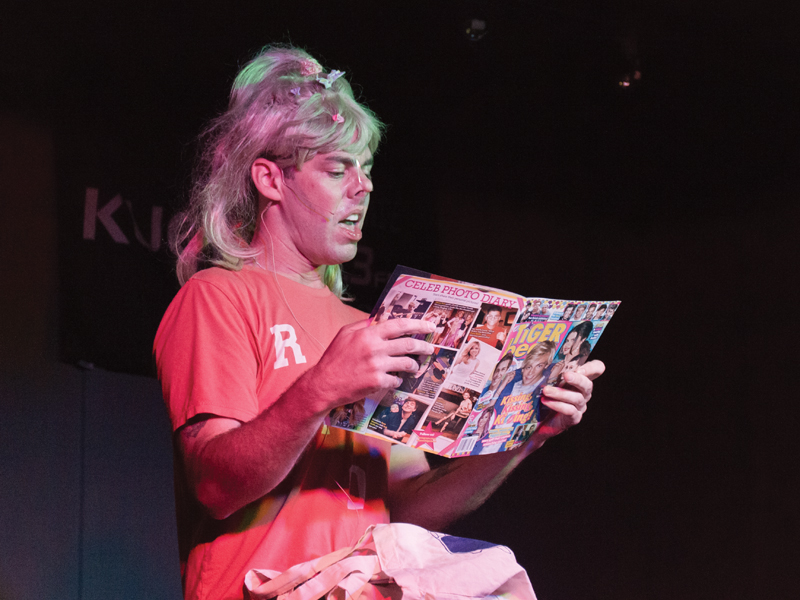
As a newcomer to Comedy Apocalypse, I was going into this with a fresh mind. Last quarter’s Comedy Apocalypse X proved that the Barn wasn’t about to follow up one bad comedic night with another, which decisively delivered on its promise to students with plenty of laughs that helped distract from the stress of preparing for finals and last-minute papers. As a newcomer to both UCR’s Comedy Apocalypse series and the Barn in general, I attended the night’s event wide-eyed and eager to see what my first visit would hold. Despite the show’s uneven structure, with the second comic outperforming the first and third, I genuinely had a good time watching a not perfect but overall fun event.
It was a cold evening at the Barn, which was near-capacity. The food in the back kept cash-strapped students full, with orders being called out left and right, music blasting from giant speakers on the stage and the general buzz of the crowd providing a friendly atmosphere for the night’s comics. At 8:30 p.m. the lights and music dimmed down, the crowd cheered in excitement and I took my seat as the first comic, Byron Bowers, made his appearance.
Much of Bowers’ act centered around issues of race, and it was often a hit-and-miss performance. One of the funnier segments involved Bowers speaking about the paradoxical truth of “forgiving people for doing terrible things” because “they provided (society) with such great service that their flaws went unnoticed,” and referenced a handful of famous historical figures, such as Martin Luther King Jr. and Walt Disney, to prove his point. “Martin Luther King: great man,” Bowers said. “But he slept with a lot of women. Walt Disney: great cartoonist, great imagination, but he was racist.” He got many laughs out of the Disney remark, noting, “He drew cartoons so well that it was years after he died that people started to realize ‘hey, these cartoons are in blackface.’ Like, who knew that crows had such big lips and ate watermelon, right?” Aside from any 20-somethings who revel in Disney nostalgia, hopefully rethought now, the crowd found his statements quite funny.
The times when Bowers’ race-related jokes missed their mark were cringeworthy. One of the more painful moments was when Bowers jokingly defended slavery by saying “everybody wanted one of us. We were the iPhone of the 1700s,” along with thanking one of his female ancestors for having intercourse with her master to give him “perfect hair.” He muttered, “Ya’ll going PC on me?” when nobody laughed.
Emily Heller, sporting shoulder-length hair and thick-rimmed glasses, was by far the funniest comic to take the stage that night. She reminded me of Louis C.K. with her self-deprecating style of humor. Unlike Bowers, Heller strived to connect her setups and punchlines to her personal life. This produced a vulnerability that allowed Heller to seem relatable to her college audience. “Don’t you fear dying alone?” asked Heller, quoting a friend concerned with how she hated to be in relationships, to which she rhetorically responded, “Well, yeah … but I also fear about dying in a gangbang. I think I just fear death in general.”
A self-described feminist, Heller liked to incorporate feminism into her jokes, even being self-referential about it. “The common stereotype is that feminists can’t be fun, they can’t be funny,” Heller smirked. “Do you guys see what I’m doing? That’s bullshit!” In one of her best segments, she quoted potentially hateful hip-hop lyrics and turned them around as whimsical one-liners. “Bitches ain’t shit!” she exclaimed, quoting Dr. Dre. “You’re right, bitches aren’t shit, they are valuable members of society. ‘I’ve got hoes in different area codes!’ — my gardening business is expanding!”
John Roberts had the weakest segment, as well as the strangest. He’s primarily known for voice acting, specifically for “Bob’s Burgers” as the voice of Linda. Roberts took to using prop comedy as his main schtick, and his act essentially came down to him donning different wigs (which wasn’t too funny), different voices (which was awesome) and impersonating imaginary characters in minute-long skits (which delivered on a hit-and-miss basis). He liked to refer to his mom, and said that she was one of the main inspirations for the creation of Linda.
Unlike Bowers and Heller, Roberts used less social commentary for his humor and more day-to-day observations. He tried to get away with it on the strength and diversity of his voice acting, but that wasn’t enough, and his skits could sometimes come across as “meh.” It felt as though the audience laughed out of courtesy here and there — it was only on occasion that we busted a gut like the way Bowers or Heller could make us do.
Like last quarter’s Comedy Apocalypse, this year provided us with a diverse list of performers that each had their own unique style. Although only one of them — Heller — could really connect to us on a personal level, each comedian had his or her moments of absolute, ear-deafening screams. Of course, the only topic that all three brought up that had anything to do with college stereotypes was about smoking weed. In fact, Roberts’ very last words were to light up a blunt in his name.
Despite a few road bumps, the eleventh installation of Comedy Apocalypse was a success. Even though I eventually reminded myself about studying for upcoming exams, final papers and the like, I’m glad that I, and the UCR community, were able to get distracted from all of that for a few fun hours.








